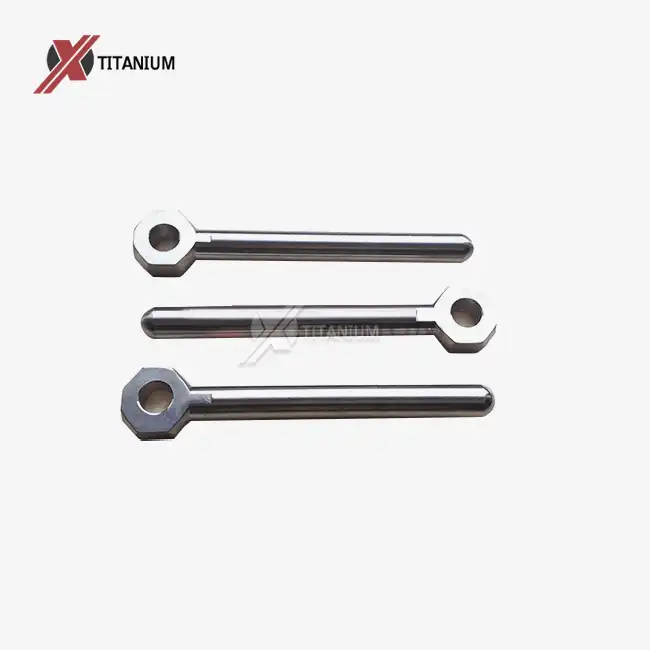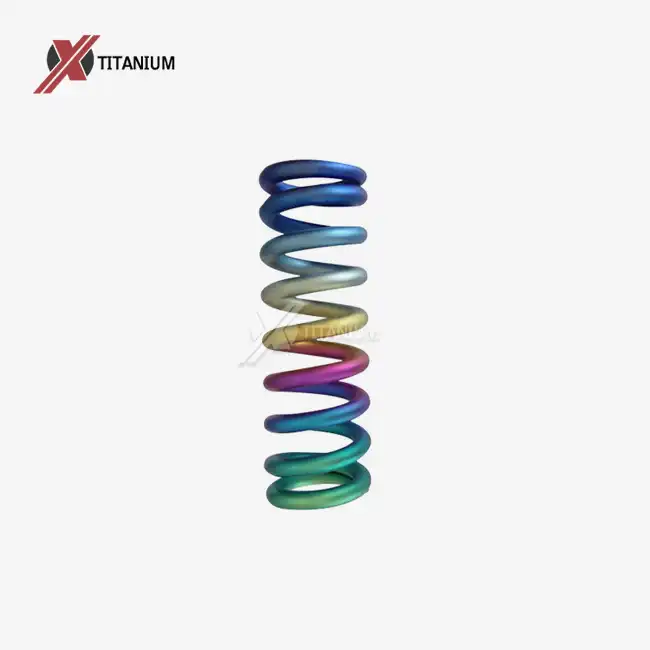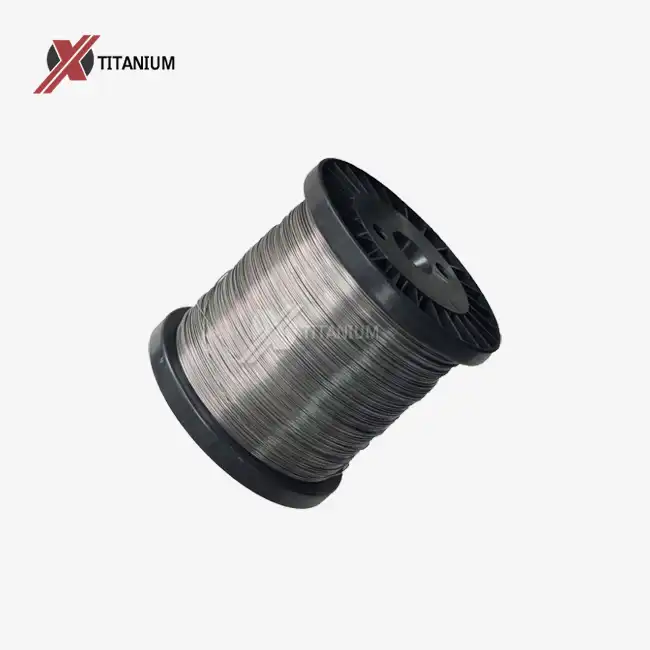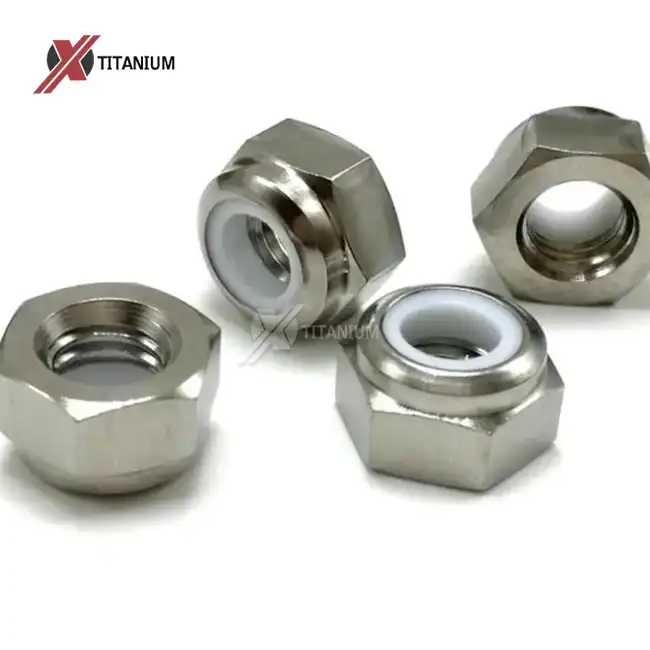The aerospace and automotive industries rely heavily on titanium alloy screws for high-temperature engine applications. These specialized fasteners deliver exceptional performance in extreme environments where conventional steel screws fail. Titanium screws maintain their structural integrity at temperatures exceeding 500°C while offering superior corrosion resistance and lightweight properties. When selecting the optimal fastening solution for your high-temperature engine project, titanium alloy screws represent the pinnacle of engineering excellence.
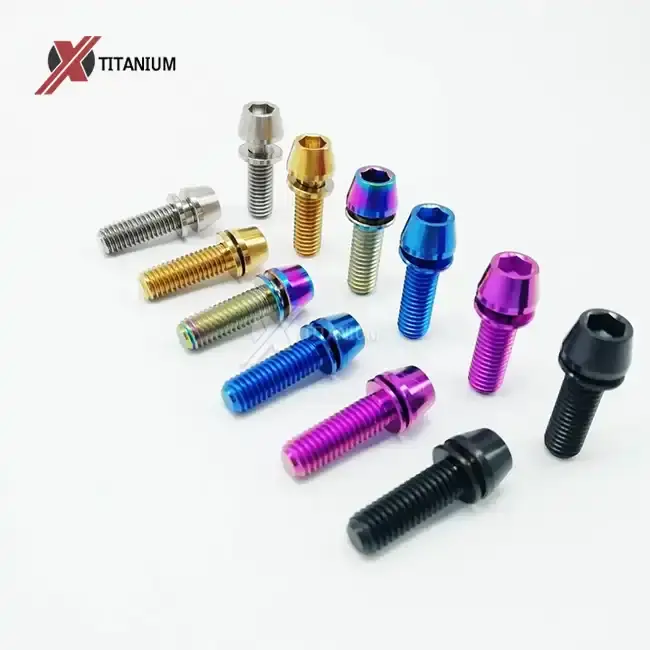
Why Focus on Titanium Fasteners for High-Temperature Applications?
The demanding requirements of high-temperature engines necessitate fasteners that exceed conventional material limitations. Titanium alloy screws provide unmatched performance in environments where traditional fasteners simply cannot survive. These aerospace fasteners offer a unique combination of properties that make them indispensable for critical applications.
Weight reduction represents a crucial advantage in aerospace and automotive applications. Titanium screws weigh approximately 40% less than steel equivalents while maintaining superior strength characteristics. This weight reduction translates directly into improved fuel efficiency and enhanced payload capacity for aircraft and vehicles.
The exceptional corrosion resistance of titanium alloys ensures long-term reliability in harsh operating environments. Unlike steel fasteners that require protective coatings, titanium naturally forms a protective oxide layer that prevents degradation. This inherent protection eliminates the need for frequent replacement and reduces maintenance costs significantly.
Heat resistance capabilities enable titanium alloy screws to function reliably at temperatures that would destroy conventional fasteners. The material's crystal structure remains stable at elevated temperatures, preventing thermal expansion issues that plague other metals. This stability ensures consistent clamping force throughout thermal cycling operations.
Selection Criteria for High-Temperature Titanium Screws
Evaluating titanium alloy screws requires careful consideration of multiple performance factors. Temperature rating serves as the primary criterion, determining maximum operating conditions without material degradation. Engineers must verify that selected fasteners can withstand peak temperatures with adequate safety margins.
Mechanical properties including tensile strength and yield strength define load-bearing capabilities. High-strength titanium alloys like Ti-6Al-4V provide tensile strengths up to 900 MPa while maintaining excellent ductility. These properties ensure reliable performance under dynamic loading conditions common in engine applications.
Corrosion resistance becomes particularly important in marine applications and chemical processing environments. The ability to resist saltwater, acids, and alkalis extends fastener service life dramatically. Surface treatment options including anodizing and nitriding can further enhance corrosion protection when required.
Manufacturing precision affects thread quality and dimensional accuracy. CNC machined titanium screws offer superior consistency compared to formed alternatives. Precision engineering ensures proper fit and optimal stress distribution across threaded connections.
Certification requirements vary by industry and application. Aerospace applications typically require AS9100 compliance, while medical applications demand biocompatibility certification. Understanding these requirements early in the selection process prevents costly delays during procurement.
Top 5 Titanium Alloy Screws for High-Temperature Engines
Ti-6Al-4V Grade 5 Socket Head Cap Screws
Ti-6Al-4V Grade 5 socket head cap screws represent the gold standard for high-temperature applications. This titanium alloy contains 6% aluminum and 4% vanadium, creating an optimal balance of strength and workability. The material exhibits excellent mechanical properties with tensile strengths reaching 900 MPa and outstanding fatigue resistance.
The alpha-beta microstructure provides exceptional thermal stability up to 500°C, making these screws ideal for engine applications. The aluminum content enhances strength while vanadium improves hardenability and thermal properties. This combination ensures consistent performance across wide temperature ranges.
Socket head design enables high torque application while minimizing tool wear. The hexagonal drive system distributes stress evenly, preventing tool slippage during installation. CNC machined threads provide precise engagement and superior holding power compared to rolled alternatives.
Surface treatment options include natural titanium finish, anodizing in multiple colors, and nitriding for enhanced wear resistance. The natural oxide layer provides inherent corrosion protection, while anodizing adds aesthetic appeal and additional protection. These fasteners excel in aerospace fasteners applications where reliability is paramount.
Available sizes range from M2 to M36, accommodating diverse application requirements. Custom lengths and special configurations can be manufactured to meet specific project needs. The lightweight materials characteristic reduces overall assembly weight without compromising structural integrity.
Ti-5Al-2.5Sn High-Temperature Hex Head Bolts
Ti-5Al-2.5Sn alloy hex head bolts offer superior high-temperature performance for demanding engine applications. This near-alpha alloy contains 5% aluminum and 2.5% tin, providing excellent creep resistance and thermal stability. The composition enables operation at temperatures up to 550°C without significant strength degradation.
The tin addition improves weldability and reduces susceptibility to stress corrosion cracking. This makes the alloy particularly suitable for marine applications where saltwater exposure is common. The material maintains its mechanical properties even after prolonged exposure to corrosive environments.
Hex head configuration provides excellent tool engagement for high-torque applications. The six-sided drive distributes installation forces effectively, reducing the risk of fastener damage during assembly. This design proves particularly valuable in confined spaces where socket access is limited.
Manufacturing processes include precision forging and CNC machining to achieve optimal grain structure and dimensional accuracy. Heat treatment optimizes mechanical properties while maintaining excellent ductility. Quality control procedures ensure consistent performance across production batches.
These bolts find extensive use in gas turbine engines, exhaust systems, and high-performance automotive applications. The combination of heat resistance and corrosion resistance makes them ideal for structural components in extreme environments. Custom head configurations and special coatings can be applied for specific applications.
Grade 2 Pure Titanium Shoulder Screws
Grade 2 pure titanium shoulder screws provide excellent corrosion resistance and biocompatibility for specialized applications. While offering lower strength compared to alloy variants, pure titanium excels in environments requiring maximum chemical resistance. The material remains stable in highly corrosive conditions that would destroy other fasteners.
The shoulder design creates precise spacing and alignment in mechanical assemblies. This configuration proves valuable in precision engineering applications where exact component positioning is critical. The smooth shoulder surface reduces wear on mating components while providing accurate reference surfaces.
Biomedical implants and food processing equipment benefit from the exceptional purity of Grade 2 titanium. The material exhibits no adverse reactions with biological tissues or food products. This makes it the preferred choice for medical device applications and pharmaceutical manufacturing equipment.
Cold working capabilities allow for secondary operations without heat treatment requirements. The material can be formed, bent, and machined without losing its corrosion resistance properties. This workability simplifies manufacturing processes and reduces production costs.
Temperature capabilities extend from cryogenic conditions to moderate elevated temperatures. While not suitable for extreme high-temperature applications, Grade 2 titanium alloy screws maintains its properties across a wide temperature range. The material's thermal expansion coefficient closely matches that of many engineering plastics and composites.
Ti-6Al-4V ELI Button Head Screws
Ti-6Al-4V ELI (Extra Low Interstitial) button head screws offer enhanced ductility and fracture toughness for critical applications. The reduced interstitial content improves material consistency and reduces the risk of brittle failure. This makes ELI grade particularly suitable for aerospace fasteners where failure consequences are severe.
Button head design provides a low-profile solution while maintaining excellent tool engagement. The rounded head distributes bearing loads over a larger area, reducing stress concentrations in thin materials. This configuration proves ideal for composite structures and lightweight panels.
Enhanced fracture toughness enables these screws to withstand impact loading and vibration better than standard Grade 5 titanium. The improved material properties reduce the risk of fatigue failure in dynamic applications. This makes them particularly suitable for rotating machinery and engine components subject to cyclic loading.
Manufacturing specifications include strict control of interstitial elements including oxygen, nitrogen, and carbon. These elements significantly affect material properties, and their control ensures consistent performance. Advanced melting techniques and quality control procedures maintain the extra low interstitial content.
Applications include aircraft structural joints, engine mounts, and critical safety components. The combination of strength, toughness, and corrosion resistance makes these screws ideal for long-term service in demanding environments. Special surface treatments can further enhance performance for specific applications.
Titanium Alloy Socket Set Screws
Titanium alloy socket set screws provide secure component retention without protruding heads. These threaded fasteners use various point configurations to achieve optimal holding power against mating surfaces. The headless design enables flush mounting in space-constrained applications.
Point options include cup point, cone point, flat point, and dog point configurations. Each design optimizes contact characteristics for specific materials and applications. Cup points provide excellent grip on round shafts, while flat points distribute loads across larger areas.
Socket drive systems accommodate both hex and Torx configurations for enhanced torque transmission. The internal drive prevents external tool damage while enabling high installation torques. This design proves particularly valuable in automated assembly processes where tool access is limited.
Material selection typically involves Ti-6Al-4V for maximum strength or Grade 2 for enhanced corrosion resistance. The choice depends on specific application requirements including load levels and environmental conditions. Both materials offer significant advantages over steel set screws in corrosive environments.
Custom fasteners can incorporate special point geometries, thread configurations, and surface treatments. Manufacturing flexibility enables optimization for specific applications including shaft retention, adjustment mechanisms, and locking applications. Quality control ensures consistent performance across production runs.
Global Market Analysis for Titanium Fasteners
The global market for titanium alloy screws continues expanding driven by aerospace, automotive, and industrial applications. North American markets emphasize aerospace applications with stringent certification requirements and advanced material specifications. European markets focus on automotive applications and renewable energy systems requiring lightweight materials.
Asian markets show rapid growth in industrial applications including chemical processing and marine equipment. The region's manufacturing expansion drives demand for corrosion-resistant fasteners in harsh environments. Quality standards continue evolving to match international requirements for critical applications.
Regulatory frameworks vary significantly across regions, affecting material specifications and testing requirements. Aerospace applications require compliance with international standards including AS9100 and NADCAP certifications. Medical applications must meet biocompatibility standards specific to each market region.
Supply chain considerations include raw material availability and processing capabilities. The concentration of titanium production in specific regions affects pricing and delivery schedules. Long-term supply agreements help ensure material availability for critical applications.
Cultural preferences influence fastener selection in different markets. Some regions prioritize cost optimization while others emphasize performance and reliability. Understanding these preferences helps suppliers develop appropriate product offerings and marketing strategies.
Purchasing Recommendations and Considerations
Successful procurement of titanium alloy screws requires careful evaluation of multiple factors beyond initial cost. Total cost of ownership includes installation labor, maintenance requirements, and replacement frequency. The superior durability of titanium fasteners often justifies higher initial investment through reduced lifecycle costs.
Supplier qualification represents a critical decision factor for high-stakes applications. Manufacturers should possess relevant certifications including AS9100 for aerospace applications and ISO 13485 for medical devices. Quality management systems must demonstrate capability for consistent production of critical fasteners.
Technical support capabilities enable successful application of titanium fasteners in challenging environments. Suppliers should provide engineering assistance for material selection, installation procedures, and troubleshooting. This support proves particularly valuable when transitioning from steel to titanium fasteners.
Inventory management strategies must account for longer lead times typical of titanium products. Strategic stocking of common sizes reduces project delays while custom specifications require advance planning. Supplier partnerships can help optimize inventory levels and ensure material availability.
Documentation requirements vary by application but generally include material certifications, dimensional reports, and mechanical test results. Aerospace applications require complete traceability from raw material to finished fastener. Medical applications need biocompatibility documentation and sterilization compatibility information.
Conclusion
Selecting the best titanium screws for high-temperature engines requires careful consideration of material properties, application requirements, and supplier capabilities. The seven fastener types discussed represent proven solutions for demanding environments where conventional materials fail. Titanium alloy screws deliver unmatched performance through their exceptional heat resistance, corrosion protection, and lightweight characteristics.
The investment in quality titanium fasteners pays dividends through reduced maintenance costs, extended service life, and improved system reliability. As engine technologies continue advancing toward higher operating temperatures and performance levels, titanium alloy screws become increasingly essential for achieving design objectives.
Partnership with experienced suppliers ensures successful implementation of titanium fastening solutions. The combination of quality materials, precision manufacturing, and technical support creates the foundation for reliable high-temperature engine performance across diverse applications.
Frequently Asked Questions
Q1: What temperature range can titanium alloy screws withstand in engine applications?
A: Titanium alloy screws can reliably operate at temperatures up to 500°C depending on the specific alloy composition. Ti-6Al-4V Grade 5 maintains excellent mechanical properties up to 400°C, while specialized alloys like Ti-5Al-2.5Sn can handle temperatures reaching 550°C. The material's crystal structure remains stable at these elevated temperatures, ensuring consistent clamping force throughout thermal cycling operations.
Q2: How do titanium screws compare to steel fasteners in terms of strength and weight?
A: Titanium alloy screws provide exceptional strength-to-weight ratios, weighing approximately 40% less than steel equivalents while maintaining comparable or superior strength characteristics. High-strength titanium alloys like Ti-6Al-4V achieve tensile strengths up to 900 MPa, matching many high-grade steels. The weight reduction translates directly into improved fuel efficiency and enhanced payload capacity for aerospace and automotive applications.
Q3: What surface treatments are available for titanium alloy screws?
A: Common surface treatments include natural titanium finish, anodizing in various colors (gold, blue, green, purple, black, rainbow), polishing, and nitriding for enhanced wear resistance. Anodizing provides both aesthetic appeal and additional corrosion protection, while nitriding significantly improves surface hardness and wear characteristics. The natural oxide layer of titanium provides inherent corrosion protection without requiring additional coatings.
Your Trusted Titanium Alloy Screws Supplier - Chuanglian
Chuanglian stands as your reliable partner for high-quality titanium alloy screws designed for the most demanding high-temperature engine applications. Located in Baoji City, known as the "City of Titanium," our company leverages over ten years of specialized experience in titanium products machining and research. Our comprehensive quality control system ensures every fastener meets the stringent requirements of aerospace, automotive, and industrial applications.
Our state-of-the-art CNC machine tools and mechanical processing equipment enable precise manufacturing of custom fasteners to your exact specifications. We maintain strict adherence to national, international, and industry standards while continuously updating our technology and equipment. Our experienced technicians understand the unique challenges of titanium alloy screws manufacturing and consistently deliver products that exceed customer expectations.
As a dedicated titanium alloy screws manufacturer, we offer comprehensive technical support throughout your project lifecycle. Our engineering team provides material selection guidance, application advice, and troubleshooting assistance to ensure optimal fastener performance. We understand that successful high-temperature engine applications require more than just quality products – they demand reliable partnerships built on technical expertise and consistent delivery.
Chuanglian's commitment to quality foremost operations ensures your titanium fastener requirements receive the attention they deserve. Contact us at info@cltifastener.com or djy6580@aliyun.com to discuss your specific needs and discover how our expertise can enhance your high-temperature engine projects.
